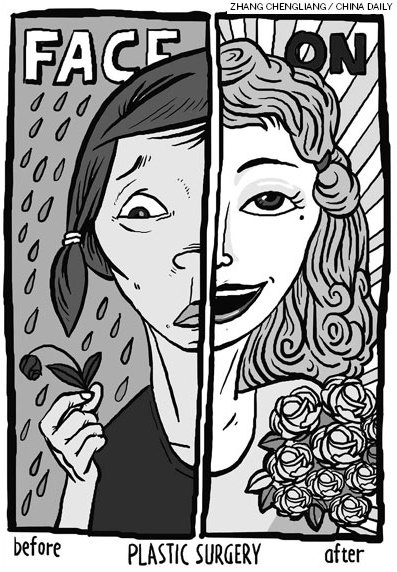Voices
Getting nose jobs to land jobs
By Qi Zhai (China Daily)
Updated: 2010-07-29 07:48
 |
Large Medium Small |

Plato postulated about the golden proportions of beauty, the "magic ratios" that make a face pleasing to the eye. A golden visage is one with a width two-thirds of its length and a nose "no longer than the distance between the eyes."
Here in China, standards of beauty are less mathematically defined, but no less widely championed:
"Female, not older than 25 years, 1.65 meters or taller, pleasant features."
"Male, 26 years or older, pleasant features, healthy constitution, unmarried."
These snippets aren't taken from personal ads on an online dating website. Nor are they physical requirements for winning a modeling contract. They are typical job descriptions printed on A4 sheets of paper and taped to restaurant windows, or posted on Ganji.com, China's own Craigslist. The professional opportunities attached to these descriptions range from waitress to customer service representative to receptionist, to telemarketer - jobs that really should have no aesthetic demands at all.
What is a job seeker to do if he or she doesn't hit the magic height or possess a "pleasant" enough mug?
There's always surgery.

Last week, I was disturbed to read this statistic: "Up to 80 percent of Beijing's plastic surgery market this summer consists of senior high school and college students hoping to improve their appearance and land better jobs." The most common procedures requested by job hunters? Double eyelids, nose jobs, breast implants, and laser treatments.
Those are just the starter procedures. Back in 2003, The Guardian in the UK reported on the rising popularity of "leg lengthening" surgery in height-obsessed China. The procedure is excruciatingly painful (put simply, a doctor breaks your legs, inserts metal pins and progressively tightens an attached steel rack to stretch the limbs), but patients were eagerly streaming in. One brave 23-year-old girl said from her hospital bed, "It hurts, but it will be worth it to be taller. I'll have more opportunities in life and a better chance of finding a good job."
Employers in China can be more explicit about their demands on employees' appearance than in the West - leading the young to shed money and tears in hope of better job prospects - but the relationship between beauty and employment has been long studied in the West. Every year, experimental psychologists give us new supporting evidence.
I remember sitting in Psychology 101 lecture years ago, shocked by the video my professor was showing. On screen, different human resource managers (unwitting experimental subjects) were interviewing one of two female job candidates (collaborators in the experiment) - one attractive, the other not so much - who submitted identical resumes. To a statistically significant degree, the hirers gave higher praise to the prettier job hunter.
More recently, studies carried out from Australia to Sweden have replicated these results. In 2007, researchers using Australian labor data found that a one standard deviation increase in beauty improves the probability of employment by 4 percent in men and 5 percent in women. Even in happy egalitarian Sweden, the same fictitious job application sent with two different photos attached - one an original, the other a digitally manipulated "obese" version - elicited different employer callback rates, by 6 percentage points to 8 percentage points (for men and women, respectively).
Other studies tease out yet more nuances. Not only do good-looking people have better luck in interviews, they also get cushier offers. A London survey of 11,000 33-year-olds found that unattractive men earn 15 percent less than attractive men, while their plain female counterparts make 11 percent less than prettier women. Studies carried out at the University of Florida, University of North Carolina, and University of Pittsburgh found that shorter people - generally deemed less attractive than their longer-limbed peers - get paid less.
Why the obsession with good-looking employees? What do big eyes, a delicate nose and chiseled cheekbones have to do with professional competence?
Explanations for the beauty-employment relationship vary, sometimes devolving into "chicken and egg" arguments.
Some say that beautiful children, teenagers, and adults get better treatment, growing up more confident, which helps them shine in job applications and salary negotiations. Others believe that there is a "halo effect" to good looks. Employers supposedly trust that attractive employees have better social skills and higher intelligence.
This blind confidence in beautiful people may even be pervasive among the masses, and not just limited to the human resource gods. An American psychologist, Gordon Patzer, sums up the phenomenon: "Good-looking men and women are generally judged to be more talented, kind, honest and intelligent than their less attractive counterparts. Controlled studies show people go out of their way to help attractive people - of the same and opposite sex - because they want to be liked and accepted by good-looking people."
So, it seems that the high school and university seniors rushing to buy surgically enhanced looks at Beijing hospitals this year may be making sensible investments in their careers? Sad, but perhaps true. I'd like to believe that poise and real qualifications can overcome appearance-based barriers, but I can see how candidates who don't meet stringent height requirements or have some kind of facial blemish or deformity have trouble simply getting a foot in the door.
Let's hope that, among other improvements, our labor laws will come to borrow from the best in the American system where it's illegal to make hiring decisions based on physical traits and disabilities. Until then, young graduates will continue to be incentivized to get nose jobs just to land jobs.